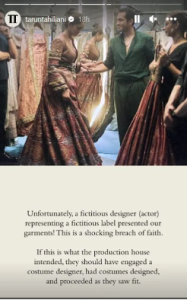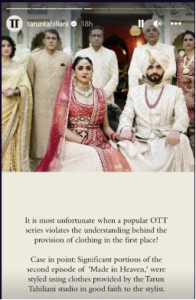Supreme Court to issue guidelines to strengthen TV channel self-regulation
The Apex Court on 14th August has said that it will issue guidelines to strengthen self-regulation of TV channels. The court critiqued the ineffectiveness of self-regulatory mechanism by the News Broadcasting Standards Authority (NBA) and asked if a fine of Rs one lakh for a channel is really effective.
The bench comprising CJI DY Chandrachud, Justice JB Pardiwala, and Justice Manoj Misra was hearing a plea filed by the NBDA (formerly News Broadcasters Association) challenging the critical observations made by the Bombay High Court against the self-regulatory mechanism for media. The High Court’s observations came in a judgment passed in January 2021 while deciding a batch of PILs questioning the media trial in the actor Sushant Singh Rajput death case.
The Supreme Court raised questions on self-regulation by the media and held that the maximum fine of Rs one lakh under the “NBA guidelines is no deterrent”. The court suggested that the fine should be based on percentage of profits. “There has to be a ‘bite’ to your regulations,” it said. “Self-regulatory mechanism has to be made effective,” the court added.
The Court also mentioned that there is effective need to be circumspect about the government regulation of media and that there should not be a need to impose a pre-censorship or post-censorship on media, but the self-regulatory mechanism must be effective. The bench gave the above observations while issuing notice on the petition.
Centre releases additional guidelines for Health and Wellness Celebrities, Influencers and Virtual Influencers
The Department of Consumer Affairs, under the Ministry of Consumer Affairs, Food and Public Distribution, has released Additional Guidelines for celebrities, influencers and virtual influencers in the field of health and wellness. These guidelines are an extension to the Guidelines for Prevention of Misleading Advertisements and Endorsements for Misleading Advertisements, 2022.
The Additional Influencer Guidelines for Health and Wellness Celebrities, Influencers and Virtual Influencers has been developed after detailed discussions with all stakeholders including Ministry of Health, Ministry of Ayush, Food Safety and Standards Authority of India (FSSAI) and Advertising Standards Council of India (ASCI). The additional guidelines aim to deal with misleading advertisements, unsubstantiated claims and ensure transparency in health and wellness endorsements. Under the guidelines, certified medical practitioners and health & fitness experts holding certifications from recognized institutions when sharing information, promoting products or services or making any health-related claims, must disclose that they are certified health/fitness experts and medical practitioners.
Celebrities, influencers and virtual influencers presenting themselves as health experts or medical practitioners, when sharing information, promoting products or services or making any health-related claims, must provide clear disclaimers and these disclosure or disclaimers should be displayed during endorsements, promotions, or at any instance of making health-related assertions.
General wellness and health advice like ‘Drink Water and Stay Hydrated’, ‘Exercise Regularly and Be Physically Active’, ‘Reduce Sitting and Screen Time’, ‘Get Enough Good Sleep’, ‘Drink Turmeric Milk for faster recovery’, ‘Use sunscreen daily to protect from harmful UV rays’, ‘Oiling of hair for better growth’, etc not associated with specific products or services or not targeting specific health conditions or outcomes, are exempt from these regulations.
DoCA will actively monitor and enforce these guidelines. Violations may lead to penalties under the Consumer Protection Act 2019 and other relevant provisions of the law.
Click here for the guidelines.
Madras HC temporarily restrains Google from delisting apps of Indian startups
A division bench of Madras High Court on August 18 passed an interim order restraining Google from delisting the apps of a bunch of Indian companies/app developers from its Play Store.
The interim arrangement is subject to the companies/app developers paying 4 percent of the gross revenue of the downloads from Play Store to Google and will have to submit such data to Google on the 15th of every month.
The court gave the order stating that the issue falls under the jurisdiction of the Competition Commission of India (CCI). According to the High Court, since the startups alleging abuse of dominant position by Google, the CCI has jurisdiction to adjudicate on the same. The high court held that CCI is empowered to direct any enterprise guilty of abuse of dominant position to discontinue such practices, hence any order passed by CCI under such circumstances would be applicable to all the businesses.
The order was passed in an appeal filed by a bunch of Indian companies/app developers challenging the order of the single judge of the Madras High Court dismissing their pleas against Google’s app billing policy. Hearing of the appeal is likely to continue on August 23.
Madras HC to hear PIL seeking revoking UA certificate issued to Rajinikanth-starrer ‘Jailer’
The Madras High Court will hear a public interest litigation (PIL) seeking direction to the Central Board of Film Certification (CBFC) to revoke the the UA certificate issued to Rajinikanth-starrer film ‘Jailer’, which allows children under 12 years of age to watch the movie with parental guidance.
The litigant contended that the movie has several violent scenes, including chopping of head and cutting of ear, which are not appropriate for children to watch.
The petitioner said the same movie has been issued an ‘Adult’ only (A) certificate in the US and the UK.
There is a scene in the film in which the antagonist hangs people upside down and smashes their heads with a hammer, the PIL contended, adding that there is also a scene in which the villain beheads a person.
Advocate Ravi said the CBFC guidelines on film certification require the board to ensure that anti-social activities, including violence, are not justified or glorified in a film.
Other than the CBFC Chairman and the Regional Officer of the censor board in Chennai, the film’s producer, Sun Pictures, and director, Nelson Dileepkumar, were also listed as respondents to the PIL.
Delhi High Court upholds order deeming Satyajit Ray as first owner of copyright in Bengali film Nayak
The Delhi High Court has upheld a single-judge’s ruling that legendary filmmaker Satyajit Ray is the first owner of the copyright in the 1966 Bengali film Nayak because he wrote the screenplay for the movie.
A division bench of Justice Yashwant Varma and Justice Tushar Rao Gedela dismissed the appeal moved by RDB and Co. HUF, whose ‘Karta’ R.D. Bansal had commissioned Ray to write and direct the film, challenging the single judge order passed on May 23.
The plaintiff HUF had sought to restrain publishing house Harpercollins from novelizing the film written by Bhaskar Chattopadhyay. The book was published in May 2018.
Vide the impugned order, the single judge had allowed Harpercollins’ application seeking rendition of a summary judgment for dismissal of the suit on the ground that it was bereft of any cause of action. Consequently, the HUF’s prayer seeking permanent injunction against the publication house was rejected.
Upholding the single judge order, the division bench said that the copyright in the screenplay of the movie would clearly have to be recognised to vest in the author of the literary work, i.e. Satyajit Ray. It added that once it is recognised that the copyright existed in the author of the screenplay, any right which the plaintiff HUF could claim in the cinematographic work would not have either impacted or diluted Ray’s right in the screenplay.
To read order, click here.
Made In Heaven season 2 controversy: After author Yashica Dutt, designer Tarun Tahiliani calls out Zoya Akhtar-Reema Kagti’s show for alleged use of his designs without due credits
After a huge controversy with author Yashica Dutt, the Made In Heaven 2 creators have found themselves in another dispute with Tarun Tahiliani. The veteran fashion designer has recently accused the Prime Video show of a violation in a series of his Instagram stories.
The iconic Indian designer took to Instagram and shared a few images from the second episode of Made In Heaven 2 featuring Mrunal Thakur and others, claiming that his designs have been used without credits.
The first IG story features the official poster of the second episode featuring Mrunal and Siddhant Karnick, where the actress sports the bridal look. The caption on the image by Tahiliani claims that a significant portion of episode two showcases the dresses designed by Tarun Tahiliani studio but credit to their brand in nowhere to be found. Meanwhile, the second image in the IG story sees Mrunal trying on her bridal attire, while a fictional character portraying as a dress designer.


Snippets of the Story posted by the famous Designer.
In the third image of the IG story series, Tahiliani criticises the OTT show and mentions, “Let’s hope that this scenario does not repeat itself with other designers who have graciously lent their work for OTT productions”.
Meanwhile, on Thursday, answering the Yashica Dutt fiasco, creator-producer Zoya Akhtar shared a huge statement on her Instagram handle and rejected all claims and allegations of author Yashika Dutt of Plagiarism and portrayal of her real-life character.
Louboutin lands Injunction in its latest red sole trademark Registration Bid
A district court in Rio de Janeiro has sided with Christian Louboutin in the latest round of its bid to register its red sole as a trademark in Brazil. On the heels of the Brazilian Patent and Trademark Office (“BPTO”) rejecting Louboutin’s trademark application for registration for its use of the color red on high-heel shoe soles in May, counsel for Louboutin sought an annulment of the application’s rejection. In a preliminary – but nonetheless, notable – victory for Louboutin, the 13th Federal Court of Rio de Janeiro has handed the French footwear brand an injunction, making for one of the first administrative-level assessments of the registrability of “position” trademarks in South America.

Restart Of WGA-AMPTP Talks Brings Hope As Window For Meaningful Seasons Of Scripted Broadcast Series Narrows
With TV development and production at a standstill amid two major Hollywood strikes, by the WGA and SAG-AFTRA, Labor Day is taking on additional significance as a threshold for the writers’ work stoppage to end in order for the networks to air meaningful seasons of their original live-action scripted series of at least 13 episodes. Crossing it without a deal or significant progress between AMPTP and WGA by October could delay new 2023-24 series’ launch until fall 2024 and put some sophomore and bubble shows — even beyond broadcast — in potential danger.
AI vs Journalism: The New York Times considers legal action against OpenAI amid copyright tensions
Attorneys representing The New York Times are exploring the possibility of initiating legal action against OpenAI to safeguard the intellectual property rights associated with its journalistic content, according to confidential sources who shared the information with NPR.
Recent discussions between The Times and the developers of ChatGPT have been marked by tense negotiations aimed at reaching a licensing agreement. This agreement would involve OpenAI compensating The Times for incorporating its news stories into the artificial intelligence tools developed by the tech company. However, these negotiations have become increasingly contentious, prompting The Times to contemplate pursuing legal measures.
If The Times were to file a lawsuit against OpenAI, it would give rise to a significant legal clash centred on copyright protection within the realm of generative artificial intelligence.
Large language models such as ChatGPT gather extensive data from the internet to inform their responses to various queries. This data collection process often occurs without explicit permission. The legality of this practice remains an open question.
Should OpenAI be found guilty of copyright violations during this process, federal law permits the infringing materials to be eradicated at the conclusion of the legal proceedings.
In practical terms, if a federal judge determines that OpenAI unlawfully replicated articles from The Times to train its AI model, the court could order the destruction of ChatGPT’s dataset. This would compel OpenAI to recreate its dataset solely using authorised content.
AI-Created Art Isn’t Copyrightable, Judge Says in Ruling That Could Give Hollywood Studios Pause
More than 100 days into the writers strike, fears have kept mounting over the possibility of studios deploying generative artificial intelligence to completely pen scripts. But intellectual property law has long said that copyrights are only granted to works created by humans, and that doesn’t look like it’s changing anytime soon.
A federal judge on Friday upheld a finding from the U.S. Copyright Office that a piece of art created by AI is not open to protection. The ruling was delivered in an order turning down Stephen Thaler’s bid challenging the government’s position refusing to register works made by AI. Copyright law has “never stretched so far” to “protect works generated by new forms of technology operating absent any guiding human hand.
Read order here.











